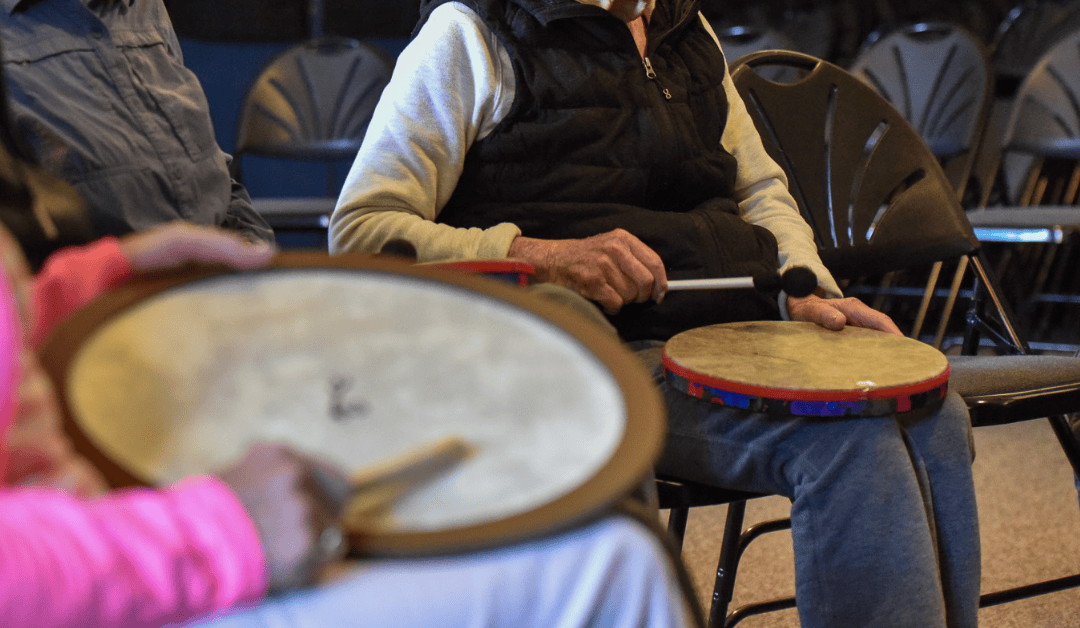This article was written by Sherise Talbott, Swallow Hill’s Membership and Individual Giving Manager.
We’d like to introduce you to Terri, a dedicated staff member at Wind Crest Senior Living Community. Terri works as a residential assistant and has extensive experience working alongside residents involved in Swallow Hill’s Music Therapy program. Terri has witnessed firsthand the profound impact of music on the lives of Wind Crest’s residents. From moments of musical recognition to recalling personal memories, Terri sheds light on the transformative elements of music therapy within the senior community. Join us as we explore Terri’s insights into the therapeutic essence of music and the joy it brings out in residents at Wind Crest.
How long have you been working with Swallow Hill Music Therapy programs at Wind Crest?
I’ve been working with Wind Crest residents and Swallow Hill musical therapists at Wind Crest since before COVID.
What have you witnessed with your residential participants in the Music Therapy program at your facility?
The residents really love the musical programming and when you add the therapy aspect of it, it takes the experience to the next level. Residents are not just sitting, listening to someone play the guitar. They are involved in the music. All the Swallow Hill music therapists have been great; we’ve all been very pleased with the music therapy program. Each therapist takes the time to learn the resident’s names and also a little bit about each participant. One thing that is nice about the therapists is that they tend to be a little younger than our other performers and instead of playing music from the 40s (like they are so used to), they will play a John Denver song or something that adds musical variety to the docket. Our residents really respond well to that variety because it is different from their sing-alongs or what other performers play.
One thing that I love about the music therapy program is that it gets the residents moving and muscularly involved. The therapists will bring sticks for residents to tap out the rhythm or scarves to wave to the beat of the music. This encourages participants to continually move and engage with the music! I feel like the activities, with the simplest of instruments, are so great for our residents on our memory floor. The scarves they bring offer a nice, fluid freedom of movement and gives participants some independence with how they engage with the music. This not only helps them to stay focused but gets their bodies involved and moving.
Have you witnessed any remarkable successes or notable transitions in participants that you’d like to share?
We have a resident who was a classical pianist and a teacher. She is a very gifted individual, but at this point in her life she prefers to be away from noise and activities. She tends to keep to herself, but during sessions that involve music she will come and join in. Her foot will start to tap or her hand will move with the rhythm, and it’s great to see her engage with the group, gladly. She is one example that there are people who will not participate in many activities, but the music will bring them to engage.
Do you feel like music therapy has a significant impact on the residents? How, based on your observations?
Music therapy really does bring residents back to moments in their lives, and especially with the memory care patients. Most of the time they aren’t able to remember much, and music therapy is such a beneficial thing for them because it gives them a feeling of worth and importance. It can be so hard to not remember things that happened to you 5 minutes ago. They can feel so discouraged in their day to day, but music can help them feel more at ease. They come to a music session and it can jog a memory of a tune they once sang or it could bring a breakthrough moment where they remember a beautiful memory. I think it’s so valuable to folks in memory care.
It’s also valuable to Wind Crest staff because it helps us get to know our residents better. I mentioned the resident who will be inspired to play the piano, and that inspiration will help us learn more about her and her past interests. We had one gal who was an opera singer, who was cast as Madame Butterfly on Broadway. Staff didn’t know about this fun fact until she really let loose during a singing activity. These sorts of responses to music will only lead to stories that help us to better connect with folks. You really get insights into people’s personalities and learn a little bit about who they were, prior to times of memory loss. Music gives these folks the opportunity to be who they are, and not worry about doing it right. They just react and the program meets them where they are at.
DONATE: Become a supporter of Swallow Hill’s Music Therapy programs

